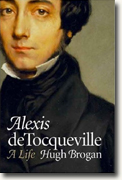Alexis de Tocqueville
Hugh Brogan
book reviews:
· general fiction
· chick lit/romance
· sci-fi/fantasy
· graphic novels
· nonfiction
· audio books
· author interviews
· children's books @
curledupkids.com
· DVD reviews @
curledupdvd.com
newsletter
win books
buy online
links
home
for authors
& publishers
for reviewers

 |
Alexis de Tocqueville: A Life Hugh Brogan Yale University Press Hardcover 736 pages March 2007 |
|
The aspect of the life of Alexis de Tocqueville which interests me most is his powerful sociological work, Democracy in America. This is not just because I’m a 21st-century American seeking to understand a 19th-century Frenchman, but because, as historian/author Hugh Brogan seems to suggest by his structuring of this first biography of Tocqueville, the composition of that work defined Tocqueville to himself was in fact autobiography as much as travelogue as much as socio-political analysis.
“It is like the story of a dream, the more so as much of the description concerns travel at night. On the second day an Indian appeared from nowhere and loped along the trail at their heels, easily keeping up with the horses and never speaking…Tocqueville could not help lingering beside a stream for a few minutes to enjoy the ‘sublime horror’ of the silent night wood. Presently, they came to a cabin where, instead of a watchdog, there was a bear on a chain…”Later in this same passage, Brogan tells us, Tocqueville and his companion met up with a half-breed boatman for the Indians who, to their utter amazement, warned them against speaking French with a Norman accent. Travel shook Tocqueville free from his cultural moorings, and he declared that he could never return to “a life of potatoes.” He traveled in France and elsewhere and wrote more (England, Mémoire sur le paupérisme, for example), but nothing that followed it had the motivating power of De la democratie en Amérique. America was the bright future, and his birthplace the dark crumbling past overburdened by too much rhetoric, whether from the ancien régime of the monarchists or the fire-brand wielding proponents of socialism. Tocqueville in his later years reminisced fondly and admiringly about America where, he believed, the “tyrannous majority” had yet to usurp liberty, and where decentralization was a hallmark of governance. Curiously, he was a white supremacist who decried slavery for the reason that the disparity between the races would, he thought, pull America down. He advocated mass deportation of American slaves to Liberia. But overall it was the purity of America’s independence that spoke to him: “He who travels in the United States feels involuntarily and instinctively so convinced that the institutions, taste for and spirit of liberty are bound up with every custom of he American people that he can’t conceive of any government for it except a republic.” Perhaps because Tocqueville wrote so well and so prolifically, no one before has undertaken his biography. Brogan’s book is bursting with details of Tocqueville’s private and public life and the intricacies of the politics of his country and the era. But the significance of Tocqueville’s span on the world stage derives mostly from his journey to and description of the new world, a world he embraced in spirit but could not inhabit. The ties that bound him to the old were too strong. Originally published on Curled Up With A Good Book at www.curledup.com. © Barbara Bamberger Scott, 2007 |
|
|
|
 Click here to learn more about this month's sponsor! |
|
| fiction · sf/f · comic books · nonfiction · audio newsletter · free book contest · buy books online review index · links · · authors & publishers reviewers |
|
| site by ELBO Computing Resources, Inc. | |
 Alexis de Tocqueville was born in post-revolutionary France, and as a member of the aristocracy, he was raised on vivid memories of the blood and sacrifice surrounding the events of 1789. Heavily embroiled in the complex politics of his own culture, Tocqueville was to say, “I threw myself upon America in a kind of frenzy.” He saw, though sometimes with blinders on, that European civilization was in decline and admired the rough and ready ambience of frontier America as an antidote to the ills of the old countries. His exposition about America was at times rigidly analytical (he had come there to write about the prison system) but more often romantically conceived and executed. Brogan highlights, for example, Tocqueville’s segment on a trek through the Michigan north woods:
Alexis de Tocqueville was born in post-revolutionary France, and as a member of the aristocracy, he was raised on vivid memories of the blood and sacrifice surrounding the events of 1789. Heavily embroiled in the complex politics of his own culture, Tocqueville was to say, “I threw myself upon America in a kind of frenzy.” He saw, though sometimes with blinders on, that European civilization was in decline and admired the rough and ready ambience of frontier America as an antidote to the ills of the old countries. His exposition about America was at times rigidly analytical (he had come there to write about the prison system) but more often romantically conceived and executed. Brogan highlights, for example, Tocqueville’s segment on a trek through the Michigan north woods: